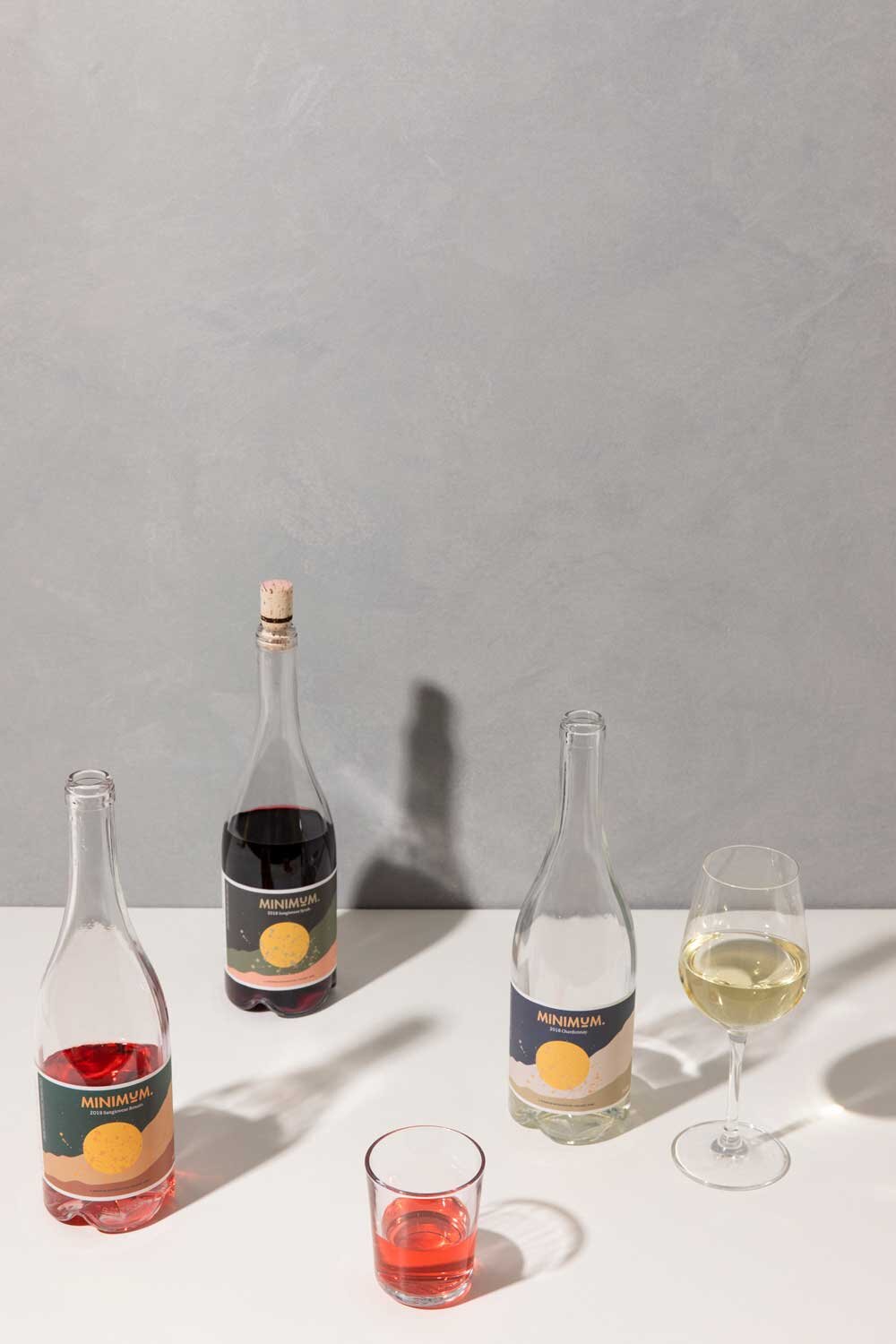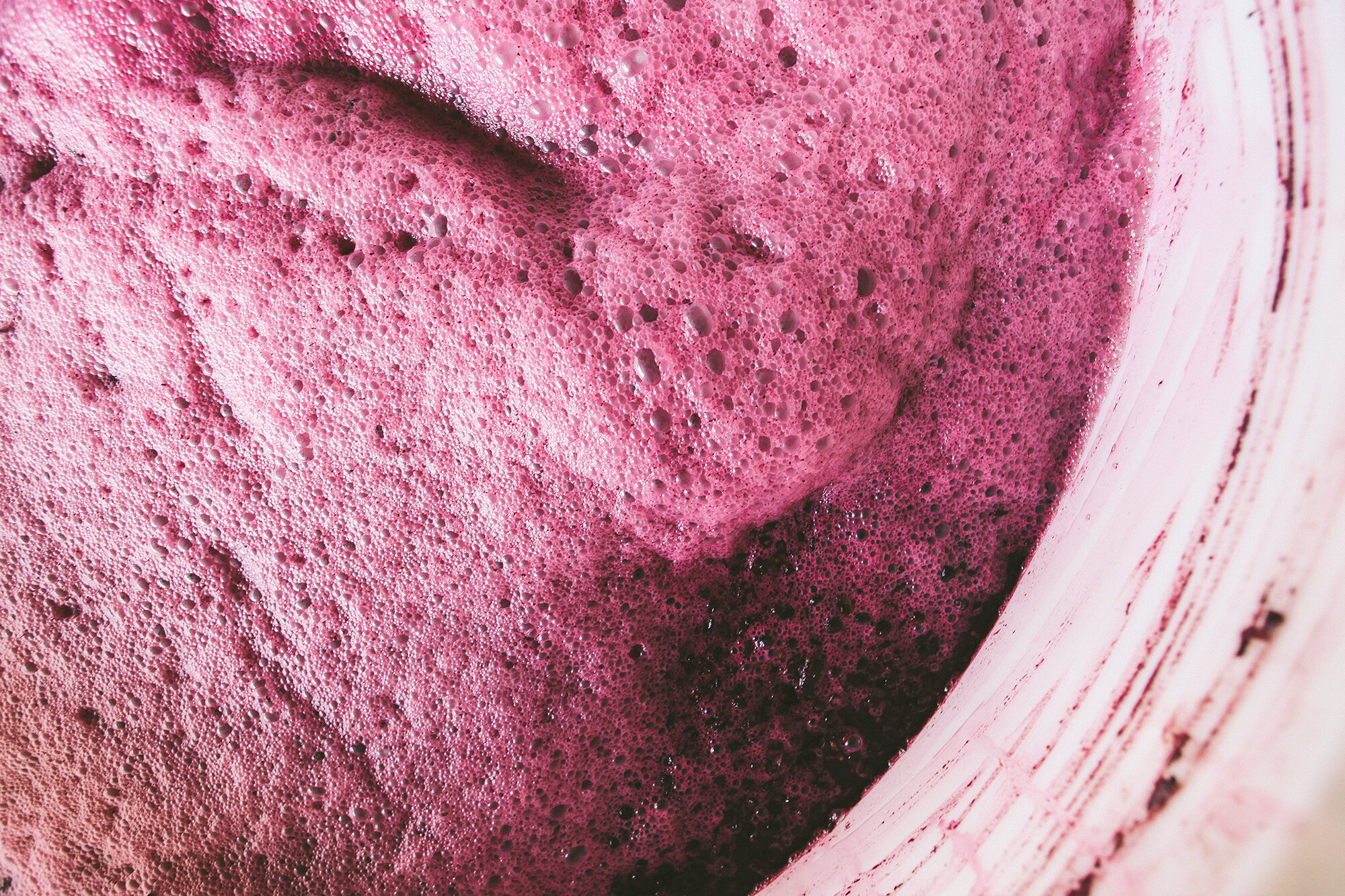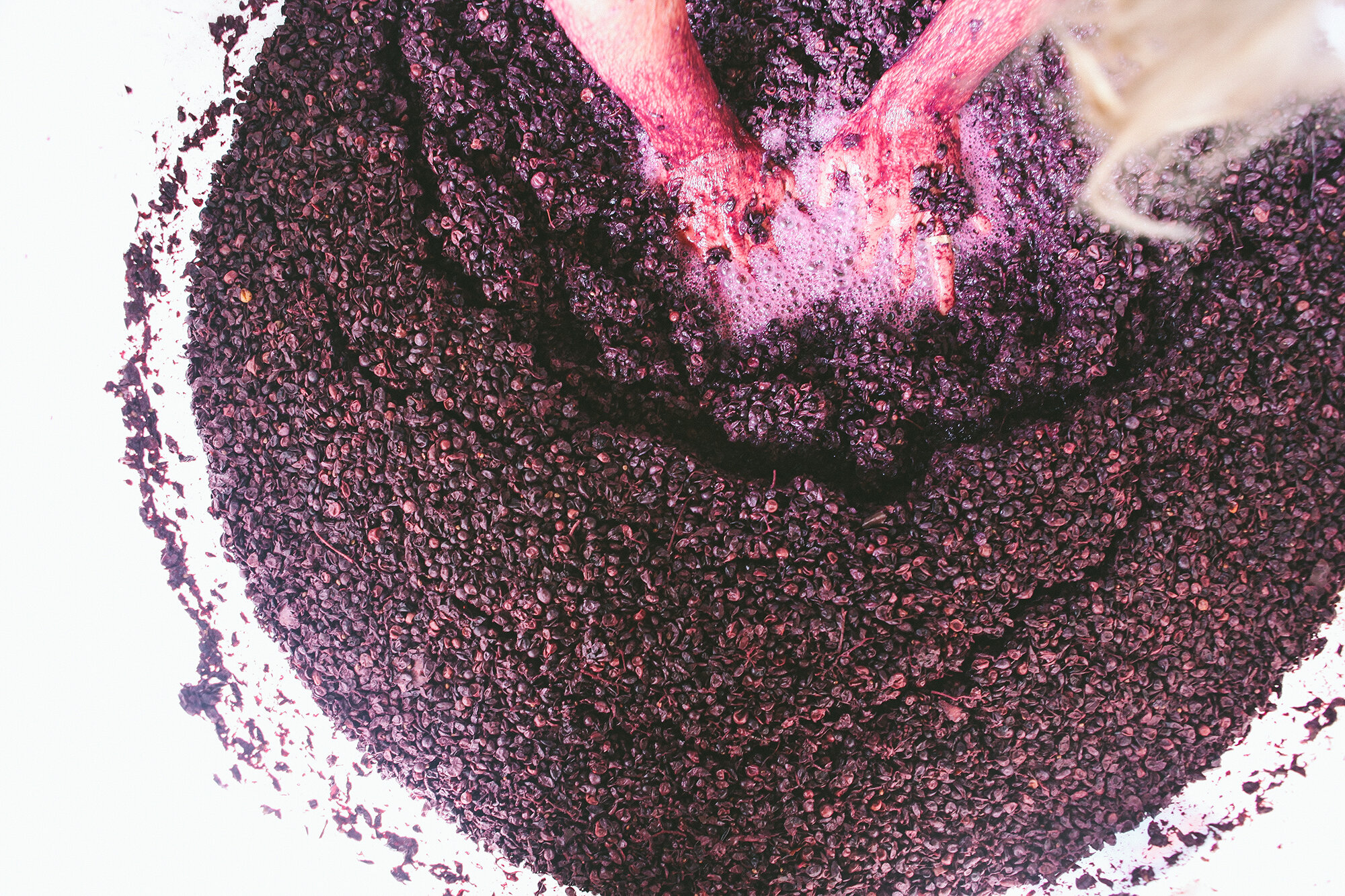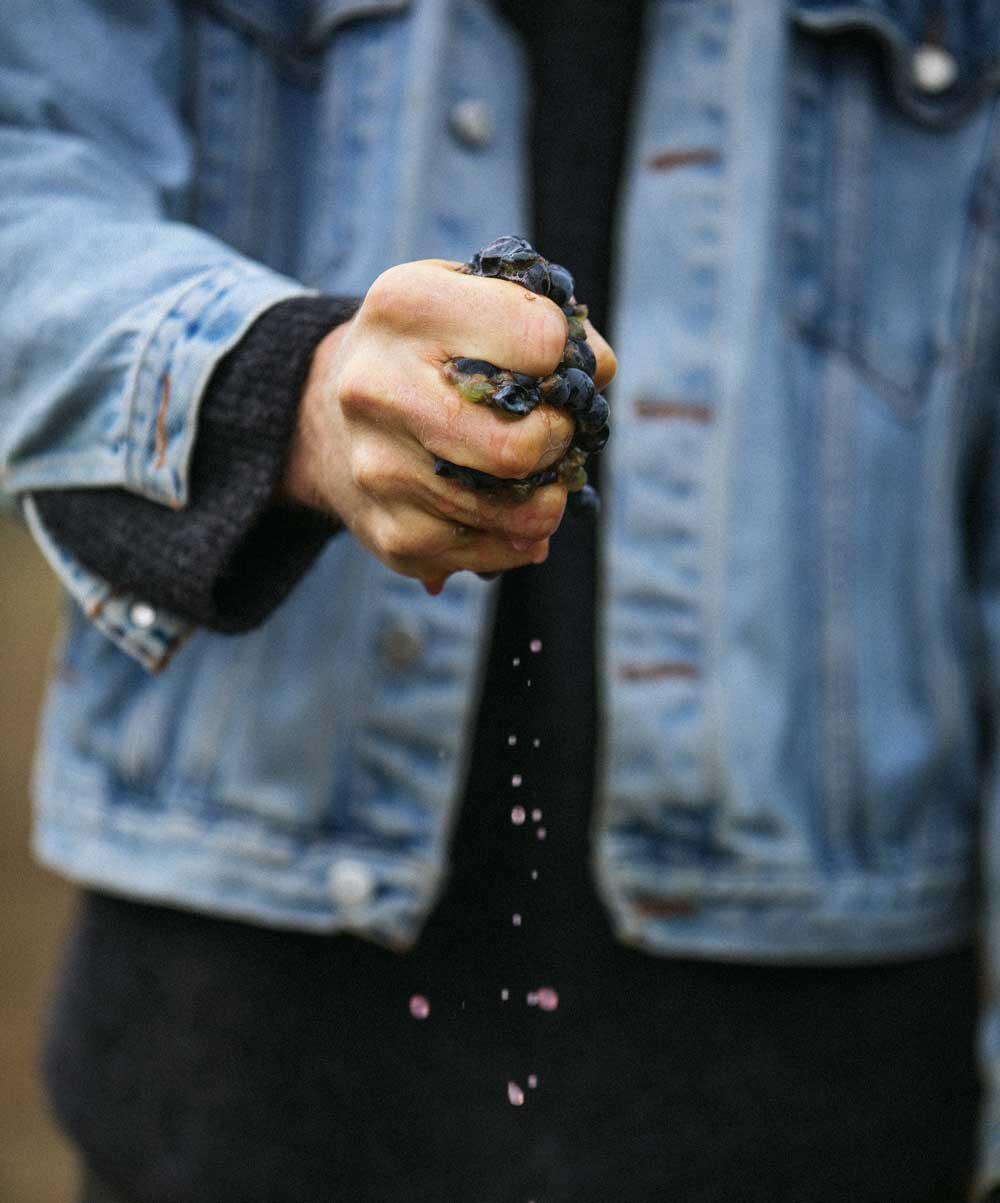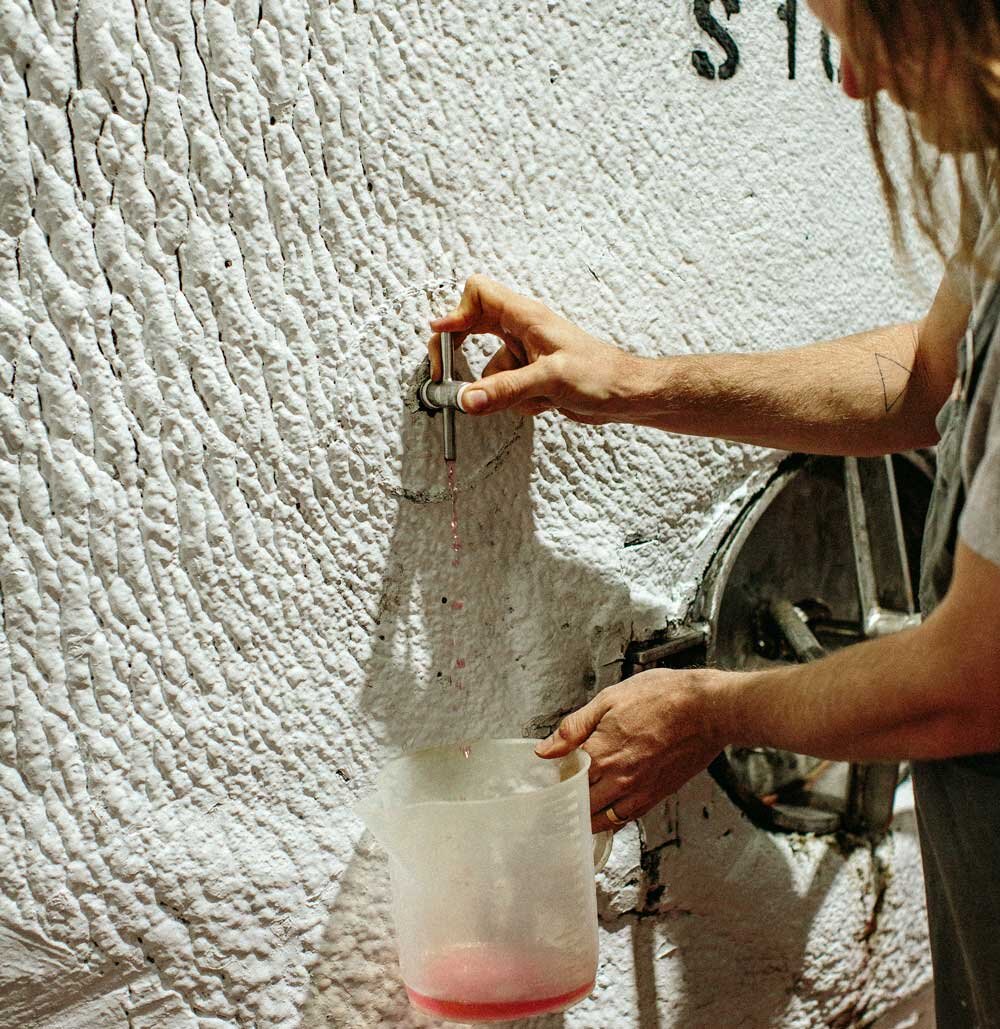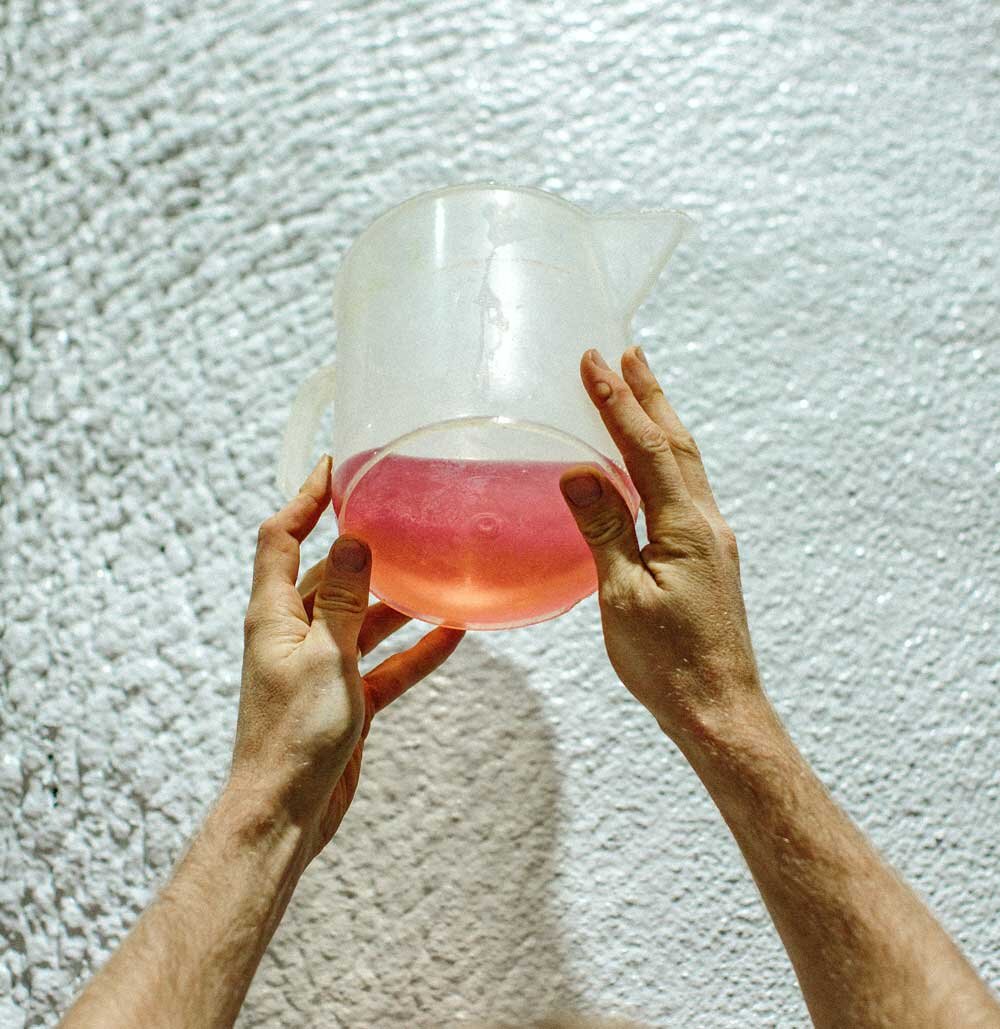Grown and Gathered's Matt Purbrick explains natural wine
Imagery: Hilary Walker // @hilarywalkerphotography
Words: Sarah Tarca // @tarca
Matt and Lentil Purbrick // Image: Morgan Shoermer
Been to a bar lately? Then you’ve probably noticed something different about the wine list – and we’re not just talking about the absence of NZ Sauv Blanc. Natural, organic, minimal intervention and vegan wines are dominating the lists with their funky smells, cloudy colouring and deliberate faults challenging the palate’s of us regular wine swiggers… not to mention confusing the hell out of us. Because, what is natural wine anyway? Isn’t it all ‘natural’ given that it comes grapes and all?
Organic and natural is something that Matt Purbrick knows a bit about. As one half of the wildly successful Grown and Gathered he and partner Lentil are gardeners, farmers, authors (of two books!) and sustainability champions who believe that organic farming should just be called farming… this should just be the norm, the given. And we agree.
With this ethos and background, it’s no surprise that when Matt and Lentil tried their hand at making wine (a collaboration with Matt’s winemaker father, Alister), the result was both organic and sustainably produced (oh, and vegan to boot), because this is at the very heart of what they do. The label – Minimum Wines – they say is for those who “like to think, feel and wonder”, and while it’s vegan and organic, they don’t claim to be ‘natural’. Confused? Us too, so we asked Matt to explain it all for us. And here it is: natural wine, explained. Cheers to that!
what exactly does it mean for a wine to be natural?
Natural wine is wine as it used to be – before all the checks and balances of the modern world came into play. There is no set definition but everyone pretty much agrees that it means organic/biodynamic grapes that have been fermented with indigenous yeasts (wild fermented) without the addition of anything else, except maybe a tiny bit of sulphur at bottling, and they are also unfined and unfiltered. Personally, I think for a wine to be called natural it should be free of sulphur additions altogether, but a little sulphur can make a big difference to the end condition of the wine given all the not-so-great conditions it has to go through during transport and storage before it reaches your glass.
Others suggest a wine isn’t natural if it has been made with modern help such as irrigation in the vineyard or machine harvesters instead of hand-picking. But these elements are far less contentious than eschewing additions, commercial yeasts and filtration.
Also, there is a lot of talk out there that natural wines should taste completely funky and weird, but this is by no means a rule. Natural wines can taste super clean and crisp too. The most defining element of a natural wine is that they are invariably more complex, with many more layers of subtlety than a wine produced in a modern conventional winery. They are diverse and surprising, alive and full of joy. The term lo-fi is effectively a synonym for natural, and perhaps conveys more correctly what defines these wines from conventionally made wines (i.e: they are low-technology, low-impact, analog and true to the vine) – wine like it used to be.
What is the difference between “natural”, “minimal intervention” and “organic”?
Natural wine should mean no additions whatsoever (except potentially sulphur, as above). Also no filtration, fining and raw (meaning never heated over 40 degrees).
Minimal intervention is often lumped into the same category as natural, but really it has a little more room to move. Minimal intervention wines should still be organic or biodynamic, but small interventions (like small natural tannin or acid adjustments) may still be allowed, and small sulphur additions are more accepted. These are still very naturally made wines, but with a less rigid ‘no-additions’ policy and may utilize some fining or filtration. Minimal intervention is probably the most contentious term out there because some still claim it is a synonym of natural, whereas others agree it represents a slightly more relaxed philosophy. When we first released our Minimum wines we called them ‘minimum intervention’ and copped quite a bit from some critics who didn’t get we were just trying to make a pun on the term ‘minimal intervention’ and carve our own path. So we’ve chosen not to refer to our wines as anything but organic and vegan now because all the terms are so contentious!
Organic wines are certified through various certification bodies to ensure that during both the farming and winemaking processes no harmful chemicals or unnatural, inorganic ingredients are used. They still may contain additions of natural tannin, or tartaric acid (a refined, natural by-product of the winemaking process), or commercial yeasts or may be filtered or fined using organic processes, or heated.
Your wine is vegan… but isn’t all wine vegan?
Yes, all wine is simply made of grapes, which are of course vegan. But many wineries fine their wine using products that are made of egg whites, milk or refined parts of fish. The use of these products in the making of those wines makes them not vegan, even though there is never any trace of the products in the finished product. We use none of these products so our wines are 100% vegan.
Do natural and organic wines generally contain preservatives? If not, Do they “go bad” faster than conventional wines?
These wines can contain sulphur (natural wines generally much less or often none at all), however it is generally much less than in conventional wines. Wine inherently has a very long shelf life though and depending on the wine, it might drink at its best the year it is made, or 50 years later. It is important to enquire on a wine-to-wine basis, not based on whether the wine contains sulphur.
What exactly does sulphur do to wine?
Sulphur is a naturally occurring compound in wine, produced during the fermentation process, but this natural sulphur is only in very small amounts. Usually when we refer to sulphur in wine it is the addition of sulphur, generally as sulphur dioxide that we are referring to. It is a very powerful antioxidant, which is to say it prevents oxygen from oxidizing beneficial chemical compounds in the wine which would then alter the flavor and freshness of it. So by adding small amounts of sulphur dioxide, we protect the wine from these oxidizing effects and not-so-great flavour shifts. Provided the wines are kept in ideal conditions, out of sunlight, in a cool place, and not moved around too much, you shouldn’t need additional sulphur to keep the wine fresh. But in modern transport conditions, a little goes a long way to ensuring the wine you get in your glass tastes as fresh as the winemaker would like it to be for you.
“Unfortunately, there is no governing body for natural wines. But in a way, natural wines are a rebellion against all things regulation and convention, so it would be kind of ‘unnatural’ to have such a body.”
How do you make your wines organic? And are they certified by an external body?
Yes, we are certified through the main certifying body in Australia, the ACO. The organic guidelines are freely available online but in short all certified organic producers don’t use any chemicals during the growing or making of their wines. We take it much further than the ACO guidelines to eliminate several allowable, but in our minds slightly dubious and strange additions and unnatural processes too like using hybrid commercial yeasts, modern technologies like reverse osmosis, heating the wine and many others. And we also take a regenerative approach to farming our vines which not only eschews chemicals according to the organic guidelines, but is also about understanding and working with natural processes to regenerate healthy landscape functions and enliven soil microbes and fungi to create more nutrient dense grapes.
who regulates “organic” or “natural” claims in wine in australia – if at all?
Organic certification is 100% regulated by bodies like the ACO. If you want to claim organic certification, you must have gone through the certification process with one of these bodies. Unfortunately, there is no governing body for natural wines. But in a way, natural wines are a rebellion against all things regulation and convention too so it would be kind of ‘unnatural’ to have such a body. The way to know if a wine is truly natural is to get to know the producer, or someone that does, and build trust.
Matt & Lentil Purbrick // Image by Morgan Shoermer
What other sustainable practices are you employing at Minimum?
We are an organic, vegan label that is aiming to move more and more towards truly natural wines. However, in the quantities we are making we are unlikely to go fully natural. We will certainly always utilize a little sulphur and we aren’t against additions of natural tannin and tartaric acid at the moment. But we are aiming for 100% wild-fermented and 100% unfined and unfiltered wines from vintage 2021 and we feel really proud of that. We are also looking into Biodynamic certification given we utilize so much of the Biodynamic philosophy in our farming practices too.
On the side, Lentil and I will continue to make the 100% Natural wines we always have for ourselves and our family and friends in very small batches - hand-picked, foot-stomped, wild-fermented, nothing added, including sulphur. We love this fully natural process more than anything! But we are also pragmatic, and Minimum is a bigger project with bigger risk so we’re happy to play things a little safer! It’s a ‘and/also’ thing for us, rather than an ‘either/or’.
We will also continue to plant more and more trees every year to ensure we sequester more carbon than we produce in the making of our wines, always package in infinitely recyclable and compostable packaging and always keep pushing the Australian wine industry towards better and better practices.
Are natural or organic wines actually better for you? If so, how?
Definitely!
So much better for you and so much better for the planet! We simply can’t keep drenching our lands in chemicals that destroy plant diversity and kill all of our soil life. In the vineyard, organically farmed soils are alive and actively sequester carbon year-round. And in your belly, organic and Natural wines are bringing you only natural substances that your body recognizes and health-giving flavonoids without all the traces of damaging chemicals from harmful, modern industrial farming and food production processes.
There is no future on this planet without a complete shift to organic, regenerative farming and food production practices, and wine is no different.
Many people claim to not get hangovers with natural wine… is there any truth to that?
I definitely believe that especially true natural wines which have no sulphur added - but all other natural and organic wines too… they don’t come with the same sick feeling the next day. That said, you’ll definitely still feel hungover if you drink a lot! But it’s a different hangover, much easier on your body. I can only speculate that our bodies are far more familiar with these completely traditionally made alcohols like natural wine than they are with wines made through modern industrial methods. We’re talking 4000 years of natural winemaking vs the last 150 and especially the last 50 years of super-modern, chemically-driven, industrial agricultural and food-processing techniques. And it just seems we process them more efficiently. That’s certainly been my experience.
Minimum Wines Chardonnay // Image by Hilary Walker



